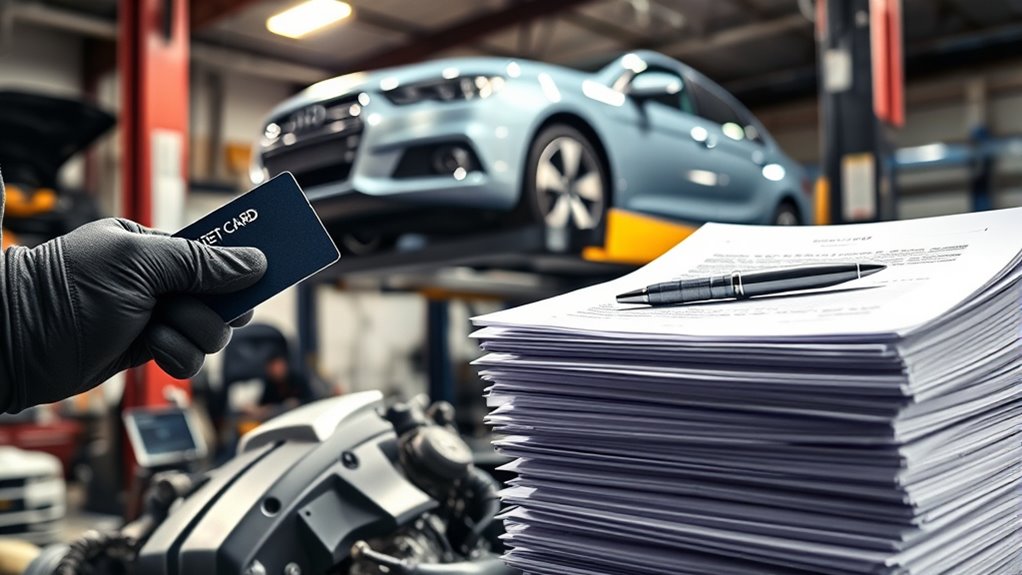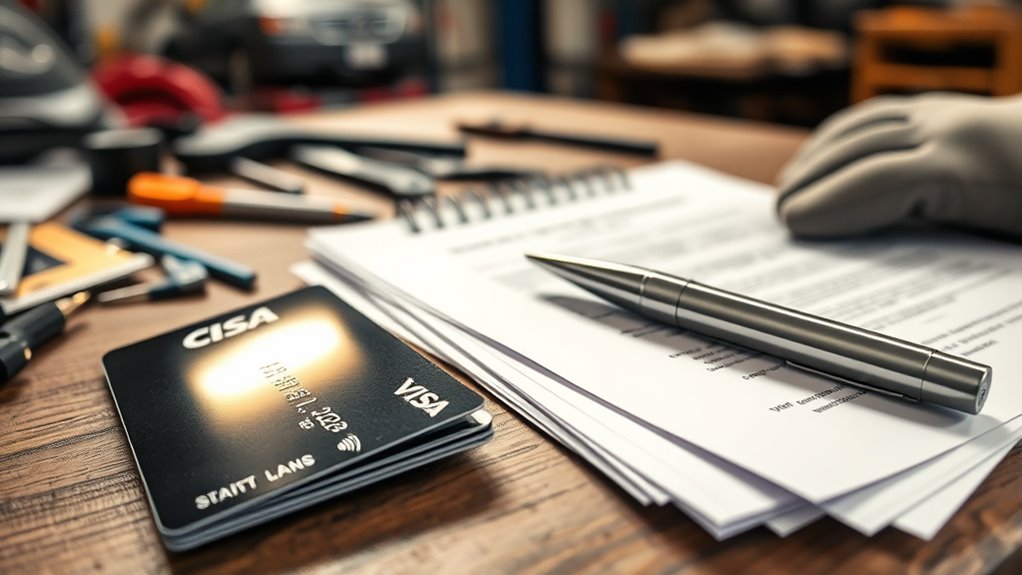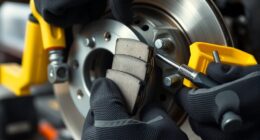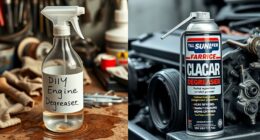When choosing between personal loans and credit cards for auto repairs, think about your financial situation and repair urgency. Personal loans often have lower interest rates and fixed payments, making them better for larger, long-term expenses. Credit cards offer quick approval and flexibility but can come with high-interest rates if balance remains unpaid. If you want to discover which option suits your needs best and the factors to consider, keep exploring the details ahead.
Key Takeaways
- Personal loans typically offer lower interest rates and fixed payments, making them suitable for larger, long-term auto repairs.
- Credit cards provide immediate access and flexibility with quick approvals, ideal for urgent repairs.
- Personal loans usually involve longer approval processes and may require collateral or stricter credit checks.
- Credit cards often have higher interest rates, which can lead to costly debt if balances are not paid promptly.
- The best choice depends on repair size, urgency, repayment preferences, and your credit profile.

When your car breaks down unexpectedly, choosing the right way to cover the repair costs can be confusing. You might consider auto repair financing options or simply rely on your credit card. Both have their advantages, but understanding how each works can help you make the best decision. Auto repair financing is designed specifically for car repairs, often offering lower interest rates or flexible repayment plans. Many providers understand the urgency of repairs and aim to give you manageable terms, so you don’t have to pay the entire bill upfront. It’s a good choice if you want to spread out payments over time and avoid high-interest rates associated with some credit cards. Plus, some auto repair financing options are tailored to your credit score, providing opportunities for those with less-than-perfect credit to still access needed funds.
On the other hand, using a credit card can be quick and convenient, especially if you already have one with good credit card rewards. Many credit cards offer cashback or points for every dollar spent, which can offset some of your repair costs. If your card has a generous rewards program, paying for repairs with it can benefit you in the long run, especially if you plan to pay off the balance quickly to avoid high interest charges. Additionally, credit cards often provide immediate approval, so you can get the repairs done without delay. This speed is essential if your vehicle is essential for daily commuting or emergencies.
However, it’s important to weigh the risks of credit card use, as outstanding balances can accrue high-interest rates if not paid off promptly. If you’re considering credit card rewards, make sure you understand the terms and whether you’ll be able to pay off the balance quickly. If not, the interest charges might outweigh the benefits of rewards. Conversely, auto repair financing might have lower interest rates but could involve fees or stricter approval criteria. It’s also worth considering that some credit cards offer promotional 0% APR periods, which can be advantageous if you can pay off the repair within that window. Additionally, understanding the importance of sound recording techniques can help you document your vehicle’s condition for insurance claims or repairs.
Ultimately, your choice depends on your financial situation and preferences. If you prefer spreading payments over time with potentially lower interest, auto repair financing might be better. If you want immediate coverage and the chance to earn rewards, a credit card could be more suitable. Just make sure you understand the terms, and avoid falling into debt traps that could make your repair costs more expensive in the long run.
Frequently Asked Questions
Can I Use a Personal Loan for Any Auto Repair Costs?
Yes, you can use a personal loan for auto repair costs, as it provides flexible auto repair financing options. However, check the loan restrictions beforehand, since some lenders may have specific conditions or limits on how the funds are used. Personal loans usually offer lower interest rates than credit cards, making them a better choice if you need a larger amount or want to pay over time without high interest.
Are There Specific Credit Cards Designed for Auto Repairs?
Yes, there are specific auto repair credit cards designed for your needs. These repair cards often offer special auto repair credit benefits, such as discounts or cashback on repairs and services. You can take advantage of repair card benefits like lower interest rates or promotional offers. Using a dedicated auto repair credit card can help you manage costs more effectively and earn rewards tailored to your auto maintenance expenses.
How Does Interest Accumulation Differ Between Loans and Credit Cards?
Imagine interest as a snowball rolling downhill. With credit cards, interest calculation often accrues daily, making it a relentless snowball that grows quickly if unpaid. Loans typically have fixed repayment timelines, so interest accumulates steadily over time, allowing you to plan payments. You’ll find that credit card interest can spike unexpectedly, while loans offer a clearer path, making repayment more predictable and manageable.
What Credit Score Is Needed to Qualify for Each Option?
You typically need a credit score of at least 630 to qualify for personal loans, with higher scores improving your chances and securing better interest rates. For credit cards, the requirements are usually lower, around 620 or above, but premium cards often demand excellent credit scores of 700 or higher. Your loan qualification criteria depend on your credit score, income, and debt-to-income ratio, which lenders evaluate during the approval process.
Are There Benefits or Rewards for Auto Repair Credit Card Use?
Yes, using an auto repair credit card can offer benefits like auto repair rewards and credit card incentives. You earn points or cash back on repair expenses, helping you save money over time. Many cards also provide perks such as discounts on services or access to exclusive offers. By choosing a card with auto repair rewards, you maximize your spending and enjoy added value through credit card incentives tailored to vehicle maintenance.
Conclusion
Ultimately, choosing between a personal loan and a credit card for auto repairs depends on your financial situation. If you prefer predictable payments and lower interest, a personal loan could be your best bet—think of it as your financial Excalibur. On the other hand, if you want flexibility and shorter-term borrowing, a credit card might suit you better. Whichever you choose, remember that in the domain of finance, prudence remains your most loyal knight.








